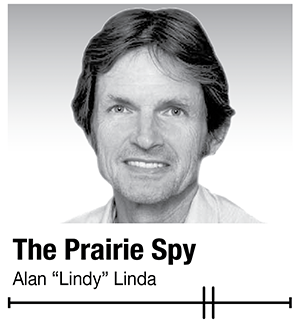A small reunion on a cattle drive
News | Published on August 19, 2021 at 11:39am EDT | Author: Chad Koenen
0
To write about this is probably a combination of old-age retrospection with an added dash of conceit that anyone is interested in the things I did as a young boy on a farm, but then, maybe some of you haven’t participated in a real cattle drive.
Each spring, we would have to drive a herd of 25 mixed white-faced Herefords with their new calves over to the Eighty. I must have been seven or eight before I figured out what the term “eighty” even meant. Up ‘til then, it was just the name of a place, like Riceville, or Perham. Then I figured out it was how many acres of land was over there, and that it was the first farm of my great-great-grandfather (more or less).
The Eighty had some low-lying land, which made great summer pasture for the cattle, and a spring-fed water hole, which solved that problem. The only downside to this? It was about three miles away, and getting the herd over there, with it numbering the same as when it left, was a big problem.
Getting all the neighbors involved was necessary, and this was one place where the old party-line crank telephones really worked well. It was nothing at all to have three neighbors on the line listening in on everyone else’s calls, so when dad started orchestrating this event, word spread quickly.
“Can you watch the Douglas #8 intersection?” dad asked that neighbor, having given the phone crank two shorts and a long. This neighbor lived just across the road from the country school which we attended. Sure enough, next thing you knew, Smalley, who had been listening in, piped in and said he’d guard the driveways into his corn field and home place. Then Harrison jumped in, and said he’d block the north road by the country school, and his entrance into an oat field.
And so it went, until when the big day came, every possible way for the cattle to escape the road was protected by cars, trucks, dogs, horses, kids, and adults.
It was pretty exciting. I always felt special, because no one else in our neighborhood did anything like this. At even the age of five or six, my brother and I would walk along behind the herd, waving our arms, acting important as we passed by the people standing sentinel alongside the road. As we walked, we hoped that one of those cows or calves didn’t decide to come back and try to go home through us. That was worrisome, to say the least.
The drive always went better when one of the older cows remembered the reason they were being driven from their winter home to the fresh juicy tall grass of that summer pasture. Cows are a lot like people. They need a leader to remind them of why change is happening, and they need to see that change as something desirable.
The bull was always a problem. Although one of the cows was often a leader, the bull was often the last of the pack, and I came to dread, as I got older and was assigned more responsibility, his resistance to following anything any other cow was doing. And this became a huge problem when it came time to cross the wooden bridge halfway to the eighty.
I remember him putting one hoof on that wood, hearing the hollow echo that it made, and then absolutely refusing to go any further. The cows slowly moved away from us—really slowly, at almost a glacial pace—while the men ganged up on that bull. They twisted his tail. They baited him with fresh corn stalks. They pushed him with the pickup truck. Nothing seemed to work. And then suddenly, he would cross, as if now that he had proven he was the boss, it was something he would do.
At about the age of seven, dad put me in the pickup truck, pulled the throttle to a bit over idle speed, put it in grandma gear (very, very slow), and said: “Just steer down the center of the road.
I was exhilarated, and terrified. This was what growing up was all about, but this could be bad, because I couldn’t reach the clutch. Dad would jump off the running board, shoo a cow or calf or the bull along, then walk back to the truck and ride again for a bit.
Each road and driveway intersection was a small reunion, a small celebration of winter being left behind, and spring having arrived, as we moved along and waved and exchanged greetings with the neighbors, and with country-school classmates.
It’s a great memory, as you can tell. Dad quit doing it finally, when small farms consolidated into large ones, and there weren’t any neighbors left between him and the Eighty to help. He never said anything, but I’ll bet he missed those days, too.

